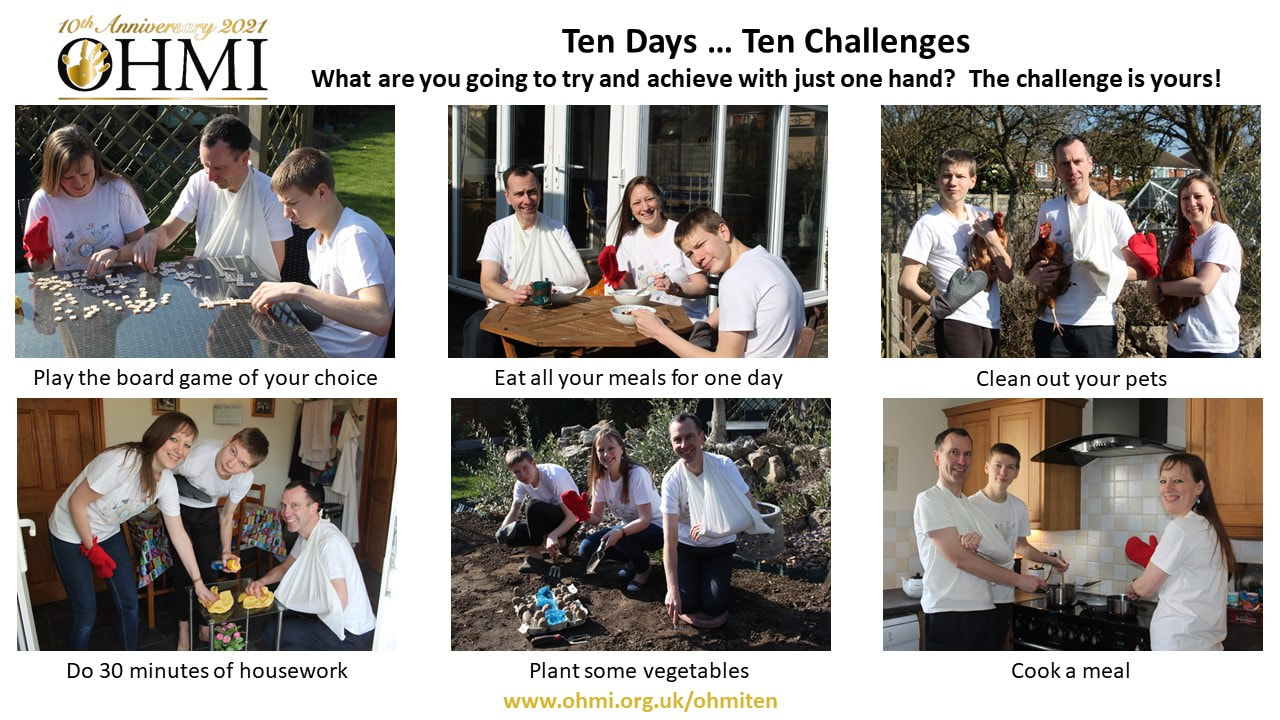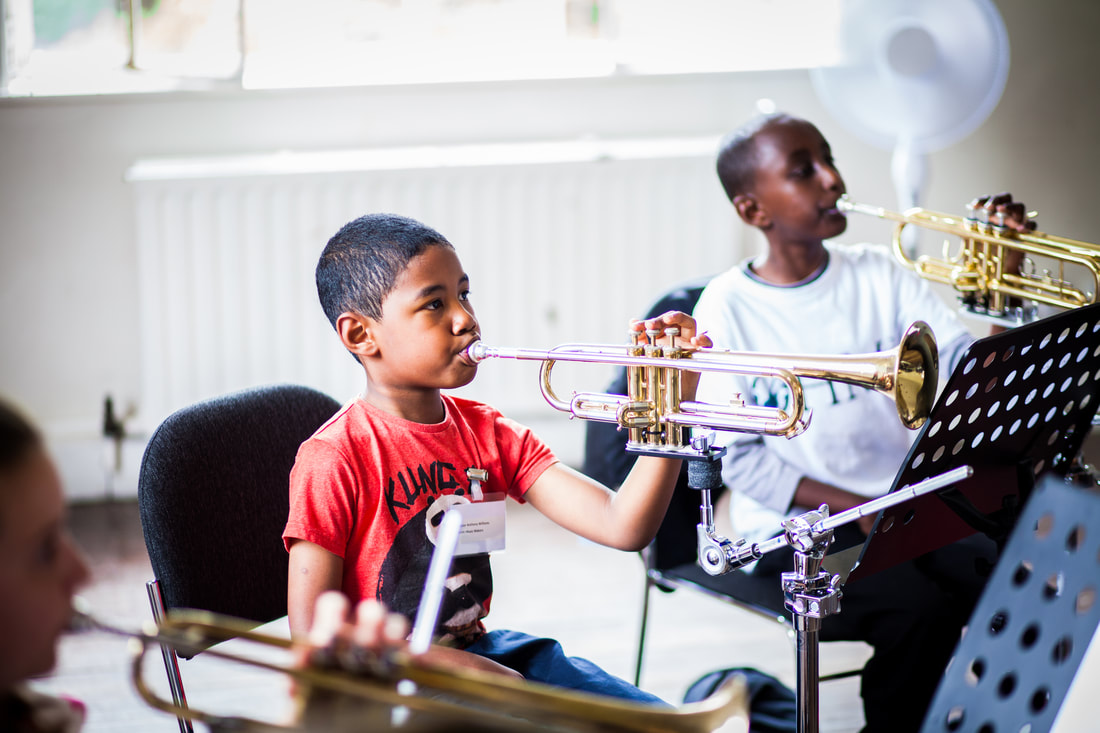|
Have you ever cut a finger, sprained a wrist or broken an arm? If so, you may have found how challenging it can be not to have full use of both hands.
Children and adults living with an upper arm impairment have to find ways of undertaking day-to-day tasks that most of us never have to question. In order to experience the challenges that those living with disability have to address each and every day, we’re putting the nation to the test! How well would you function with the use of one arm? The money raised as part of this campaign, which takes place as part of OHMI’s 10th year celebrations, will allow us to provide much needed musical instruments and access to lessons. Fancy joining us a fundraiser? We’re looking for individuals, families, sports clubs, groups and schools, and companies, to join us in this appeal and commit to at least ten different activities over a course of ten days. There are lots of activities that become significantly more challenging when carried out using one hand. Making a cake, doing a supermarket shop, writing a letter with a non-dominant hand – even hair washing! To make the experience as authentic as possible, here’s a few suggestions on what our fundraisers can do to put their other hand out of service:
One of the greatest gifts a teacher can give is the opportunity to learn. Yet this often presents a challenge when catering for pupils with additional needs.
It’s certainly the case when ensuring Whole Class Ensemble Teaching (WCET) is truly inclusive. If a child is living with an upper arm impairment, how can she or he play a brass or stringed instrument which requires the use of both hands? An assumption often made is that it is impossible. It seems fairer for the child in question not to attend the music lesson lest they feel excluded. As the UK’s leading authority on adaptation of traditional instruments, the musical instrument charity, OHMI, is uniquely positioned to provide solutions that give pupils parity of experience with their peers, and enable teachers to use uniform pedagogical approaches across a whole class. However, before it could provide the appropriate instruments, OHMI needed to assess where pupil needs lie. In 2019, the charity launched its pioneering Inclusive Access to Music-Making (IAMM) programme with Nottingham Music Service (NMS) and Creative United. The objectives of the project are three-fold: to identify the needs of physically disabled pupils; to produce a plan for WCET; and to provide accessible instruments, enabling equipment, staff training and other interventions. The results of the pilot were particularly compelling. It identified the needs of 78 children who faced a barrier to instrumental music-making, 37 of whom had a requirement for adapted instruments and/or enabling equipment. The success of the pilot led to the project’s extension in 2020. With the support of an Arts Council England National Lottery Project Grant, the project enabled the inclusion of a second year group of pupils in Nottingham, and to a second project with Northamptonshire Music and Performing Arts Trust (NMPAT). In the latest survey assessing needs for the 2020-2021 academic year, 37 schools in Nottingham and 42 schools in Northamptonshire have identified pupils who would benefit from additional support on WCET. Once needs have been pinpointed, the IAMM project serves to provide the most appropriate instrument or apparatus to allow each child to participate fully in the WCET sessions. As Ian Burton, Head of Nottingham Music Service, comments, “If there’s one thing I would urge schools to do, it’s this. However well intended, don’t make the assumption that an upper arm impairment precludes a child from making music to a high standard. OHMI has dedicated the last ten years to challenging assumptions on what’s possible but they can only offer help to the children that need it if advance notice is given to instrumental teachers of particular pupil needs.” Peter Smalley, Head of NMPAT, is in full agreement, “OHMI has come up with the most wonderfully innovative solutions for pupils in Northamptonshire. A trumpet stand which allows a pupil in Northampton to play his instrument one handed. An Artiphon which means two girls at a school in Daventry can switch to that instrument when bowing on their lap-held violin becomes too tiring. Where there’s a will – from the school, the pupil and from a Music Hub’s partnership with OHMI and Creative United – there’s almost always certainly a way.” More information on the impact of the IAMM project in Northamptonshire, from the perspective of instrumental teachers Kate and John Bickerdike, is available here. Music Hubs, teachers and parents wishing to find out more about the data identified and experiences and techniques delivered by the IAMM programme, are invited to contact OHMI at [email protected]. The world has seemed so much smaller since the outbreak of the coronavirus. With lockdown, we've been limited to virtual socialisation and spent most of our time in our local area. I'm no socialite and am perfectly happy with my own company, but I've still noticed that my social circle has reduced, and I'm stuck at home borrowing my mum's friends. It's also made dating difficult. Yes, I'm back on the (online) dating scene. It's been nerve-wracking, groan-worthy and smile-inducing. And in case you want a list: Groan-worthy
Smile-inducing
(By the way, if you're an intelligent, good-looking guy in your late twenties to early thirties looking for a long-term partner, let me know). In other good news, I've received my first dose of the AstraZeneca COVID vaccine. Unfortunately, it did make me very unwell for 24 hours. I spent that same night shivering in bed with my mum next to me and the following day lying on the sofa with achy limbs, a sore throat and a headache. However, I would much rather feel unwell for a day than hooked up to a ventilator in a hospital. Plus, my mum made me a cheese toastie for breakfast. With all this going on, my world is starting to feel a little larger. Of course, I won't be going out and painting the town red just yet, but it's nice to see the light at the end of the tunnel at last. And, as my world grows, and I've started to think further than my own back garden, I've realised that I've neglected to discuss in my blog the views towards disability in other parts of the world. Instead, I've spent the last year interviewing British/American musicians and those working in the industry or with disabled people. To rectify this, I spoke to the Hong Kong Enharmonica (HKE) orchestra hoping to gain a different perspective on music-making for the disabled and learn how other countries are supporting disabled musicians. First, some quick facts:
The perception of disability in this area of the world appears to be very different. The HKE explained that, traditionally, disability there is seen as a sickness or a punishment for misdeeds in a previous life. As a result, many disabled people hide away and are forgotten. I remember my dad once telling me that OHMI had never received submissions to the Competition from Japanese instrument-makers. And, it appears that this attitude is not limited to music. Microsoft, an American company and the creator of Xbox, designed the Adaptive Controller so that people who struggle using a traditional controller can still play. There is no such device for the PlayStation, the games console created by the Japanese company, Sony. Of course, this is all a gross generalisation. Many modern-day people don't think this; the founders, organisers and musicians of HKE, for example. Edwin Chan, who came up with the idea after seeing the Thai Blind Symphony Orchestra perform, wanted to establish something similar in Hong Kong. It grew from there and became a platform for disabled musicians to showcase their talent and enjoy making music. Jason Wu, who works for the AR Charitable Foundation that helped set up HKE, said in a documentary about the orchestra: "[People with disabilities] often achieve good results in sport. We want to show Hong Kong...that people with disabilities can do anything." In my opinion, the orchestra has achieved just that. Their performances are excellent, and they have even been supported by martial artist and film star Jackie Chan. And these musicians are really enjoying themselves. Harpist Iris Chan said: "With other charities, I often feel like a recipient, but here I can...become a giver [of music]." While Lim Yuen Fung, who plays the trumpet, said: "I really like our orchestra. I can play music with foreign musicians...I've never had that experience before." It appears that perceptions towards people with disabilities are changing there. And the concert which the HKE organised proved to be a great success. The HKE has also given disabled musicians experiences and opportunities they wouldn't otherwise have had (who doesn't want to meet Jackie Chan?) And, perhaps, it has made their world just a little larger. We’re delighted to announce our new website is now live. The launch kicks off an important year for OHMI as we celebrate our tenth anniversary.
We see our role at OHMI very much as finding practical solutions, bringing the most suitable instruments to the adult and child musicians who most need them. We’re known for our dogged determination in this respect. If there’s an instrument out there, we will hunt it down in order to add it to our portfolio. And if it doesn’t exist yet, we’ll give instrument makers across the world the support they need to research and create the instruments in question. Whilst the website has always been a useful one-stop-shop for all matters relating to music-making for people living with upper arm impairments, we’re putting more of a focus on regular and engaging content as well as resources in the following areas:
|
CategoriesArchives
June 2024
|




 RSS Feed
RSS Feed
